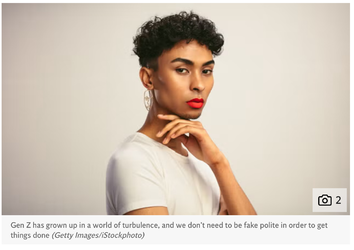https://www.the-independent.com/life-style/gen-z-stare-etiquette-rude-b2793153.html
https://archive.ph/vFs3l

Gen Z is stuck in the middle of what some older generations are calling an etiquette crisis, and now the spotlight is on our cold, dead-eyed “Gen Z stare.”
If you haven’t encountered the stare or the manufactured media outrage about it, the Gen Z stare is a blank, unbothered expression that older generations find terrifying.
Naturally, Gen Z pushed back, especially those working in the food service industry, who are often most accused of doing it.
One pizza shop employee summed it up perfectly: “You just asked me if we sell pizza.” A coffee shop worker recalled a customer asking her to explain the difference between iced and hot.
Of course we're going to stare. What is there to say when you’re being asked inane questions while earning minimum wage?
What older generations consider rude is what Gen Z sees as honest and efficient. We grew up (chronically) online. I graduated college in December 2020, started a fellowship on Zoom from my parents’ house, and didn’t set foot in an office until I moved to New York in 2022. I still haven’t worked five full days in person.

Our communication style was shaped by character limits, subtweets, and voice memos sent from bed. We learned to be blunt and concise because that is how the world we’ve grown up in demanded.
That’s reflected in how we show up to work. According to a 2024 Stanford report, Gen Z is “pragmatic” and we “value direct communication, authenticity and relevance.” Sometimes that means less small talk and more clear, precise communication.
“Which is a hard thing for older generations,” executive leadership coach Dr. Carol Parker Walsh, who works with generational workplace issues, explained, “because they were trained not to be honest and authentic, but just to adapt to whatever the workplace norms were.”
Take hierarchy, for example. It’s not that we're anti-leadership; we’re just not as impressed by titles. As Walsh noted, many of us weren’t raised with an emphasis on winners and losers. Everyone was seen as equals (yes, even if that means a participation award for all).
Combine that with growing up exposed to global issues — racial injustice, wealth inequality and climate change — and it makes sense that Gen Z views power dynamics differently. We’ll talk to the president of the organization the same way we’d talk to the maintenance staff. It’s not out of disrespect — quite the opposite, because we don’t see status as a reason to change our tone.
We’re also not interested in the performative hustle culture. With that blunt rejection, Gen Z killed the millennial fever dream ignited by Sophia Amoruso’s 2014 memoir #GIRLBOSS. Only 6% of Gen Z professionals aim for executive roles, according to Deloitte. Why? Because climbing up the corporate ladder isn’t worth the burnout, particularly with the economy and government putting so many workers at risk of layoffs.
We have different belief systems, and that’s where the tension lies. But we didn’t just appear out of nowhere. We were shaped by the society now critiquing us.
“When we tell our children: ‘You’re amazing, everything's possible, go after what you want,’” Walsh said, “I often say to older generations: if you want to point a finger, bring it back home.”
Still, as Walsh notes, even good change makes people uncomfortable. Gen Z shouldn’t have to conform to outdated norms, but we do need to recognize that transformation takes time. And for older generations, the answer isn’t trying to mold us into what was. Instead it’s about improving communication, embracing discomfort, and creating workplaces that reflect the people in them.
But the etiquette dilemma doesn’t stop with Gen Z and a shift in mindset may be already happening. Recent spikes in Google search show that people are specifically looking for answers on what’s considered rude with an increase in queries like “Is it rude to ask how someone died?”, “Is it rude to leave someone on read?” and “Is it rude to point?” — showing that everyone is questioning unclear social norms.
Perhaps Gen Z is shaking up the workplace. But if the cracks bother you, maybe the foundation wasn’t strong enough.
Author:

https://archive.ph/vFs3l

Gen Z is stuck in the middle of what some older generations are calling an etiquette crisis, and now the spotlight is on our cold, dead-eyed “Gen Z stare.”
If you haven’t encountered the stare or the manufactured media outrage about it, the Gen Z stare is a blank, unbothered expression that older generations find terrifying.
Naturally, Gen Z pushed back, especially those working in the food service industry, who are often most accused of doing it.
One pizza shop employee summed it up perfectly: “You just asked me if we sell pizza.” A coffee shop worker recalled a customer asking her to explain the difference between iced and hot.
Of course we're going to stare. What is there to say when you’re being asked inane questions while earning minimum wage?
What older generations consider rude is what Gen Z sees as honest and efficient. We grew up (chronically) online. I graduated college in December 2020, started a fellowship on Zoom from my parents’ house, and didn’t set foot in an office until I moved to New York in 2022. I still haven’t worked five full days in person.

Our communication style was shaped by character limits, subtweets, and voice memos sent from bed. We learned to be blunt and concise because that is how the world we’ve grown up in demanded.
That’s reflected in how we show up to work. According to a 2024 Stanford report, Gen Z is “pragmatic” and we “value direct communication, authenticity and relevance.” Sometimes that means less small talk and more clear, precise communication.
“Which is a hard thing for older generations,” executive leadership coach Dr. Carol Parker Walsh, who works with generational workplace issues, explained, “because they were trained not to be honest and authentic, but just to adapt to whatever the workplace norms were.”
Take hierarchy, for example. It’s not that we're anti-leadership; we’re just not as impressed by titles. As Walsh noted, many of us weren’t raised with an emphasis on winners and losers. Everyone was seen as equals (yes, even if that means a participation award for all).
Combine that with growing up exposed to global issues — racial injustice, wealth inequality and climate change — and it makes sense that Gen Z views power dynamics differently. We’ll talk to the president of the organization the same way we’d talk to the maintenance staff. It’s not out of disrespect — quite the opposite, because we don’t see status as a reason to change our tone.
We’re also not interested in the performative hustle culture. With that blunt rejection, Gen Z killed the millennial fever dream ignited by Sophia Amoruso’s 2014 memoir #GIRLBOSS. Only 6% of Gen Z professionals aim for executive roles, according to Deloitte. Why? Because climbing up the corporate ladder isn’t worth the burnout, particularly with the economy and government putting so many workers at risk of layoffs.
We have different belief systems, and that’s where the tension lies. But we didn’t just appear out of nowhere. We were shaped by the society now critiquing us.
“When we tell our children: ‘You’re amazing, everything's possible, go after what you want,’” Walsh said, “I often say to older generations: if you want to point a finger, bring it back home.”
Still, as Walsh notes, even good change makes people uncomfortable. Gen Z shouldn’t have to conform to outdated norms, but we do need to recognize that transformation takes time. And for older generations, the answer isn’t trying to mold us into what was. Instead it’s about improving communication, embracing discomfort, and creating workplaces that reflect the people in them.
But the etiquette dilemma doesn’t stop with Gen Z and a shift in mindset may be already happening. Recent spikes in Google search show that people are specifically looking for answers on what’s considered rude with an increase in queries like “Is it rude to ask how someone died?”, “Is it rude to leave someone on read?” and “Is it rude to point?” — showing that everyone is questioning unclear social norms.
Perhaps Gen Z is shaking up the workplace. But if the cracks bother you, maybe the foundation wasn’t strong enough.
Author:
